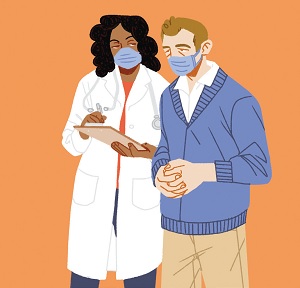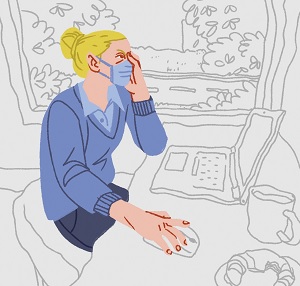Long Covid, a prevalent condition that can affect people’s ability to work and carry on with regular life, affects millions of people around the world but remains poorly understood. To meet the challenges brought on by this emerging syndrome, the Brown University School of Public Health has launched a Long Covid initiative that brings together researchers, clinicians, and experts in policy as well as strategic communications, to rapidly study and communicate the significant impact of Long Covid on people, communities, workplaces, healthcare, and society as a whole.
Brown School of Public Health launches Long Covid Initiative
With support from the Hassenfeld Foundation, the School brings together researchers, clinicians, and experts to study the impact of Long Covid on society.
“ Many of our people could be suffering from Long Covid and we must adjust and help them in a humanistic and evidence-based way. ”
 Funding for the first year of the Long Covid initiative has been provided by the Hassenfeld Foundation. The Brown School of Public Health is committed to expanding the scope and funding of this important work as part of its larger efforts on pandemic preparedness and responses.
Funding for the first year of the Long Covid initiative has been provided by the Hassenfeld Foundation. The Brown School of Public Health is committed to expanding the scope and funding of this important work as part of its larger efforts on pandemic preparedness and responses.
Brown trustee and chairman of Hassenfeld Family Initiatives, Alan Hassenfeld said, “As leaders across all fields, we must be sensitized [to the fact]that many of our people could be suffering from Long Covid and we must adjust and help them in a humanistic and evidence-based way.”
 Led by Dean Ashish Jha and fellow pandemic expert and Academic Dean Dr. Megan Ranney, the Long Covid initiative taps into the School’s unique expertise and partnerships with the Warren Alpert Medical School, its affiliated hospitals, and the Rhode Island Department of Health.
Led by Dean Ashish Jha and fellow pandemic expert and Academic Dean Dr. Megan Ranney, the Long Covid initiative taps into the School’s unique expertise and partnerships with the Warren Alpert Medical School, its affiliated hospitals, and the Rhode Island Department of Health.
“The pandemic’s devastating death toll has meant that we have at times been slow to acknowledge the growing number of people living with continued complications from COVID-19,” says Ashish K. Jha, MD, MPH, dean of the Brown School of Public Health. “Every third COVID-19 patient still experiences at least one symptom weeks or months after becoming infected. For some people, Long Covid is so disruptive they can no longer work or manage family responsibilities. We urgently need a better understanding of how Long Covid affects people and systems, so our programs and policies can meet this new reality.”
 It expands on a recent initiative by the National Institutes of Health, which focuses on studying the clinical aspects of Long Covid, and acknowledgements such as the Biden administration’s July announcement that people with Long Covid can qualify for disability under federal law.
It expands on a recent initiative by the National Institutes of Health, which focuses on studying the clinical aspects of Long Covid, and acknowledgements such as the Biden administration’s July announcement that people with Long Covid can qualify for disability under federal law.
Specifically, the Brown School of Public Health Long Covid initiative will:
• Generate knowledge to fill evidence gaps and share emerging evidence with a focus on the social and economic impact of Long Covid.
• Apply an equity lens to all aspects of the work. Given the disproportionate impact of the pandemic on communities of color, Long Covid, too, may be affecting Black and brown Americans more than others. The project will specifically call out where data and information on any population is missing, and collaborate to generate and synthesize such evidence on how Long Covid affects all populations.
• Evaluate emerging policies and develop potential policy recommendations for health system leaders, employers, and federal, state and local health policy makers and others.
• Work to provide employers with tools to appropriately work with impacted employees.
• Develop a web and social media platform to share knowledge, news and latest evidence, and to engage experts, practitioners, policy makers, media representatives and the general public in conversations and learning about Long Covid.
“The pandemic will end, but Long Covid is here to stay,” said co-director Laura Chambers, adjunct assistant professor of epidemiology. “It is essential we study it, understand who is affected, and what the direct and indirect impacts will be for patients, their families and caregivers, and health systems.”
